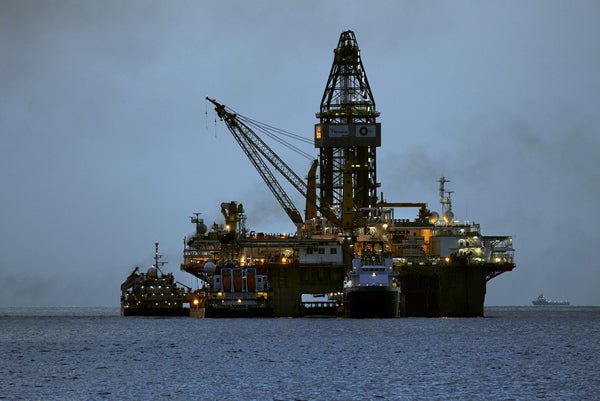Yesterday, the Department of Interior released its new five-year offshore drilling plan. Unfortunately, the program is far less expansive when it comes to opening areas to access, exploration, and drilling than it should be.
The plan schedules 15 possible lease sales in the 2012–2017 time horizon—10 in the central and western Gulf of Mexico, two in the central Gulf, and three off the coast of Alaska.
More glaring, however, is the areas that are still off-limits. The Atlantic and Pacific coasts, areas the Obama Administration once considered opening, remain closed to more drilling. The Arctic oil and gas drilling is extremely modest and should have been much more aggressive.
Granted, some of the new lease sales would not have been for a few years, but there’s a good bet that in those few years we’re going to need jobs, oil, and federal government revenue. If there’s a commercial interest to explore and drill in these areas, our federal government should allow companies to pursue them.
National Ocean Industries Association president Randall Luthi emphasized the problem with excluding Virginia in a press release:
A particularly disturbing omission from the next program is a lease sale offshore Virginia, despite clear support from the Commonwealth. While we have seen a history of deference to states that do not want development off their shores, this represents a new direction in the history of American offshore development. Despite the strong bipartisan support for inclusion from the Governor, the Legislature, both Senators, and a majority of the congressional delegation, and even its inclusion in the previous 5 year plan, they are being denied. As the Department of the Interior has repeatedly made clear, it would not be issuing new permits if it was not convinced that it could be done safely. If we can move ahead in the Gulf of Mexico to provide new energy and jobs to the nation, surely we can meet these challenges elsewhere in the [Outer Continental Shelf].
Both of Virginia’s Senators, Jim Webb (D) and Mark Warner (D), expressed disappointment in the department’s decision to exclude Virginia. Senator Webb said, “Oil and gas exploration within the Virginia Outer Continental Shelf—if coupled with an equitable formula for sharing revenues between the state and federal governments—would boost domestic energy production, while benefiting the commonwealth’s economy.”
Among the many broken pieces of America’s offshore energy policy is the split between federal and state government royalty revenue. Implementing an even split would go a long way to encourage more offshore oil and gas production and promote states’ rights.
Senator Lisa Murkowski (R–AK) offered some encouraging words: “While the administration has not opened any new areas to leasing, I’m encouraged that they are moving forward with offering sales in both the Beaufort and Chukchi seas.”
But she also raised an important, overlooked issue: “The permitting process will be the determining factor as to whether these lease sales are ultimately successful or not.”
Federal regulators should work to return the permitting process to pre-moratorium levels and provide a sensible time limit for legal challenges so these projects aren’t held up for years like Shell’s exploration endeavor off the coasts of Alaska. Allowing access for exploration and creating an efficient regulatory process that allows energy projects to move forward in a timely manner would not only increase revenue through more royalties, leases, and rent; it would also create jobs and help lower energy prices in the process.
